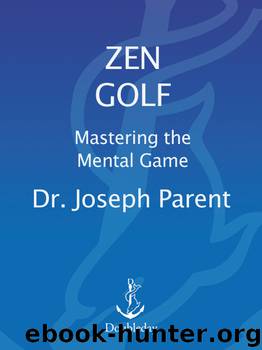Zen Golf by Joseph Parent

Author:Joseph Parent [Parent, Joseph]
Language: eng
Format: epub
ISBN: 978-0-385-50715-8
Publisher: Knopf Doubleday Publishing Group
Intuitive Mind
Intuition is a kind of knowing without thinking or analyzing. Intuitive mind directs the body without conceptual thoughts. Imagine how difficult life would be if we had to think about every movement we make. Intuitive mind is the basis of habits. Once we’ve learned a sequence of movements through repetition, we don’t need to direct each step consciously. What’s referred to as “muscle memory” isn’t in the muscles; the memory is in intuitive mind.
Intuitive mind functions as “bare” awareness: It gathers the experiences of the senses without adding concepts or judgments. Because intuitive mind is nonconceptual, it is never in the past or future but always present and always connected to the body. Therefore, when the intuitive mind is in control, body and mind are synchronized. When we’re mainly in the mode of thinking mind, self-consciousness interferes and body and mind are not synchronized. Golfers know how self-defeating that is.
Intuitive mind can direct muscle movements in very subtle increments. When the thinking mind tries to run the body, it does a very bad job. This is because it only uses concepts, which are general categories, like “harder” or “softer.” It’s like giving someone directions without being able to use anything shorter than miles. If a turn is two and a half miles ahead, you can only say “two miles” or “three miles.” In either case someone would miss it by a half-mile. The same applies to golf. If our thinking mind is in control as we’re about to putt, and it directs the body with the thought “Hit it hard enough,” the ball goes six feet past the hole. When we trust our intuitive mind to run our body, we have a much better touch around the green.
There’s a story that a worm asked a centipede how it moved all those legs in the right order. As soon as the centipede thought about it, it got all tangled up and couldn’t move. In golf that’s called paralysis from analysis. Golfers describe themselves as thinking about so many things to do (or not to do) that they feel mentally twisted up like a pretzel.
This doesn’t mean we should reject the thinking mind. It’s essential for analyzing the situation, making calculations, and selecting appropriate strategies. However, when it comes time to execute the shot, we need to make a transition. We need to picture a clear image of the ball traveling to the target, then let intuitive mind take over. That’s why the best prescription is, “Plan with your head, then play from your heart.”
Download
This site does not store any files on its server. We only index and link to content provided by other sites. Please contact the content providers to delete copyright contents if any and email us, we'll remove relevant links or contents immediately.
Golf is Not a Game of Perfect by Bob Rotella(1421)
Letters to a Young Writer by Colum McCann(1310)
Final Rounds by James Dodson(1218)
All Courses Great and Small by James W. Finegan(1147)
Back Spin by Harlan Coben(1145)
Caddyshack by Chris Nashawaty(1123)
My Life in and out of the Rough by John Daly(1122)
The Caddy's Cookbook by Tripp Bowden(1109)
How Champions Think: In Sports and in Life by Bob Rotella(1072)
The Best of Reader's Digest by Editors of Reader's Digest(1072)
Alice Cooper: Golf Monster by Alice Cooper(1053)
Chasing Greatness by Adam Lazarus(1050)
The Sorceress by Michael Scott(1046)
Every Shot Counts by Mark Broadie(1037)
Carl Hiaasen by The Downhill Lie(1035)
The First Major by John Feinstein(1031)
Tiger Woods by Jeff Benedict & Armen Keteyian(1008)
No Limits: My Autobiography by Ian Poulter(996)
Scott, Michael - The Sorceress by Scott Michael(978)
